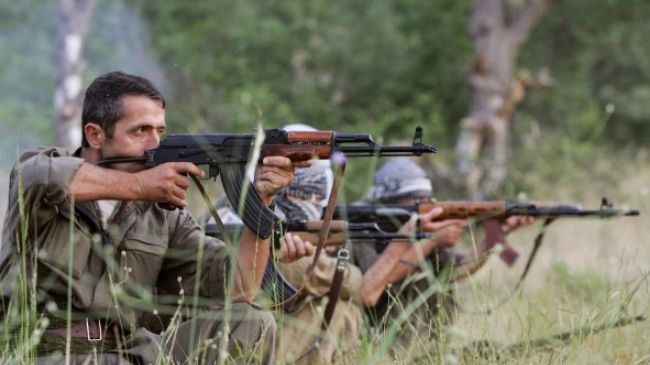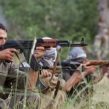
Kurdish Rebels Look to Form Transitional Government in Syria
Publication: Terrorism Monitor Volume: 11 Issue: 15
By:

It has recently become clear that the Kurdish nationalist Partiya Yekîtiya Demokrat (PYD – Democratic Union Party) wants to form an interim government in the Kurdish regions of Syria on the basis of imprisoned Partiya Karkerên Kurdistan (PKK – Kurdistan Workers’ Party) leader Abdullah Öcalan’s concept of “democratic confederalism,” first announced in March, 2005. [1] The PYD is a member of the Koma Civaken Kurdistan (KCK – Kurdistan Communities Union), a Kurdish nationalist umbrella group that aims to create “federal structures in Iran, Turkey, Syria, and Iraq that are open for all Kurds and at the same time form an umbrella confederation for all four parts of Kurdistan.” The PYD’s decision to pursue a transitional government was backed by the 9th Assembly of the People’s Congress of Kurdistan (KONGRA-GEL) held from June 30 to July 5. The KCK then took the decision to “advance the present politics in Rojava [a reference to Kurdish areas of Syria], to declare interim governance and to achieve the level of building a Kurdish local government” (Firat News Agency, June 12; July 10).
Abdullah Öcalan describes “democratic confederalism” as:
The KCK’s focus on Kurdish self-governance in Syria shows that the PKK thinks that this status is more achievable in Syria than in Iran or Turkey. The Kurds of northern Iraq are already effectively self-governed through the Kurdistan Regional Government (KRG).
The PYD plan is to create a draft constitution and to form “an interim transitional administration and get ready to prepare the suitable environment for free elections which would result in forming a legitimate, comprehensive and democratic administration.” [3] Salih Muslim, the co-chair of the PYD, said the Syrian self-governance project was first planned in 2007 (AFP, July 19).
On July 20, the PYD discussed its self-governance plan with Syria’s largely left-wing opposition front, the National Coordination Body for Democratic Change (NCB), a political bloc that is unrecognized by the larger Syrian National Council (SNC). The PYD is the lone Kurdish member of the NCB, which said it would support the PYD’s project only if it was a temporary measure and did not affect the unity of Syrian territory (Yekiti Media, July 24). According to PYD spokesperson Alan Semo, the transitional administration would be integrated into a future Syrian government (al-Monitor, July 19). The PYD also held meetings on the issue with the KRG’s Patriotic Union of Kurdistan (PUK), the Kurdistan Democratic Party (KDP), various opposition groups in northern Iraq and other Kurdish parties from Syria in order to hold a dialogue with most of the Kurdish groups that will be stakeholders in the Syrian project.
The Kurdish parties in Syria are roughly divided into two blocs that compete over influence inside the Kurdish-dominated areas of northern Syria:
- The first is the Qandil, or Sulaymaniya, bloc that unites the Syrian Kurdish parties close to the Patriotic Union of Kurdistan (PUK), whose headquarters are in the northern Iraq city of Sulaymaniya, and the KCK, whose main headquarters are in the Qandil mountains of northern Iraq. The bloc includes institutions set up by the PKK such as the Yekineyen Parastina Gel (YPG – People’s Defense Units), which acts as an unofficial Kurdish army, the Asayish, which acts as unofficial police force, and Jahbat al-Akrad (Kurdish Front), a pro-Kurdish Free Syrian Army (FSA) brigade that operates in the mixed Arab-Kurdish areas of al-Bab, Aleppo and Raqqah, where it shares power with other combatant groups.
- Another bloc is the Erbil bloc, which is unofficially led by Massoud Barzani’s KDP and includes four parties that are members of the Democratic Political Union (Kurdwatch, January 7). These four Kurdish parties are also part of the bigger Kurdish National Council (KNC) formed on October 26, 2011 with the support of Barzani and PUK leader and Iraqi president Jalal al-Talabani.
The Erbil bloc is perceived to be close to Turkish policies, while the Qandil/Sulaymaniya bloc is seen as being closer to Russian and Iranian policies. Despite this, the KCK and the PYD say that they follow a neutral third line (not for or against the Syrian opposition), while the KDP doesn’t support Kurds who join the main Syrian opposition bloc supported by Turkey.
These internal Kurdish divisions could pose a problem for the KCK’s plan for self-governance since the Erbil bloc parties are afraid that in a future self-governed Kurdish region they will still be dominated by the KCK/PYD. Thus, it might be difficult to ensure the full participation of other Kurdish parties.
Moreover, there is opposition to the self-governance project from anti-Assad groups, Turkey and the West. The Syrian National Council (SNC) is opposed to the formation of a Kurdish interim government before the fall of Assad, a position shared by Turkey (al-Monitor, July 22). The U.S. State Department also expressed its opposition towards the plan (World Bulletin, July 23). Although the Syrian government seemed to have accepted temporary de facto Kurdish autonomy since 2012 in order to focus on fighting insurgent groups, Russia seems to be sympathetic to the PYD and enjoys good contacts with both the PYD and the left-wing Syrian NCB opposition coalition (al-Monitor, June 8).
The biggest challenge to a transitional government may lie in controlling the three Kurdish enclaves in northern Syria since these Kurdish areas are interspersed with Arab areas that are controlled by anti-Assad armed groups. The PYD needs a presence in these areas for easier access from Hassakah governorate to Ayn al-Arab and Afrin. Moreover, these mixed areas have increasingly come under the control of al-Qaeda linked proxies such as Jahbat al-Nusra and the Islamic State of Iraq and Syria (ISIS) that aim to create an Islamic emirate and thus oppose Kurdish autonomy.
Clashes erupted on July 16 between Jabhat al-Nusra/ISIS and the YPG in Hassakah governorate (al-Monitor, July 16). On July 23, Jabhat al-Nusra/ISIS announced they had undertaken a decision to oppose the PKK’s separation project, saying it could lead to an Arab-Kurdish war in Syria (Media Center Raqqah, July 23).
Since the autonomy plan does not have full local, regional or international support, it could face difficulties in implementation. Even though the PYD tries to make it clear to other rivals that they support the territorial integrity of Syria rather than its division, these rivals do not believe these assertions and often claim they are nothing more than a ploy by Assad. Thus, it is likely that fighting could increase and that the PYD will try to obtain more support from the West as it tries to include other Kurdish parties of the Erbil bloc in the self-governance project.
Wladimir van Wilgenburg is a political analyst specializing in issues concerning Iraq, Iran, Syria, and Turkey with a particular focus on Kurdish politics.
Notes
1. Abdullah Öcalan, “The Declaration of Democratic Confederalism”, KurdishMedia.com, April 2, 2005, https://www.kurdmedia.com/article.aspx?id=10174.
2. Ibid.
3. Statement of the Executive Committee of Democratic Society Movement (TEV-DEM), Qamishlo, July 18, 2013, https://rojhelat.info/en/?p=6162.





